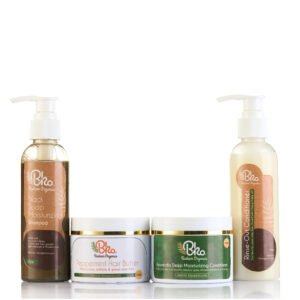The way most ladies get obsessed with “skin care” routines, serums etc, should be the same way we should obsess about scalp care; the scalp is also part of our skin, and proper treatment will give you unbelievable results with your hair growth. First thing we need to do is understanding scalp health is VERY IMPORTANT to us getting healthy hair, and the long passed down misconception that Africans can’t grow long hair down to the waist, or its just cause of the genes. There is a tribe in Africa that grow their hair up to their thighs, they are known as the The Mbalantu Tribe, they reside near the southern tips of Angola and northern border of Namibia. The women of this tribe cover their hair in a homemade mixture that keeps their hair moisturized and lubricated which is why their hair never breaks; even from childhood.
The scalp is not just the surface from which hair grows; it’s an integral part of the skin that requires specific care to ensure that the hair follicles embedded within it can produce healthy, strong hair. This detailed guide will explore the anatomy of the scalp, common scalp issues, and comprehensive care techniques to maintain optimal scalp health and support robust hair growth.
Introduction to Scalp Health
The scalp plays a pivotal role in overall hair health. It is comprised of several layers of skin and contains numerous hair follicles from which hair grows. Each component of the scalp, from the type of skin to the density and depth of hair follicles, influences hair health. Proper care tailored to the scalp’s specific needs is crucial for preventing scalp disorders and promoting healthy hair growth.
Detailed Anatomy of the Scalp
Understanding the structure of the scalp is essential for identifying and addressing various scalp issues:
- Epidermis: This is the outermost layer of the scalp, which acts as a barrier to protect the underlying tissue from infection, dehydration, and environmental stress.
- Dermis: Beneath the epidermis, this layer contains tough connective tissue, hair follicles, and oil glands. The oil glands produce sebum, which helps to moisturize and protect both the hair and scalp.
- Subcutaneous Tissue: The deepest layer provides insulation for the head and acts as a cushion for the skull. This layer contains the blood vessels and nerve supply essential for the health and growth of hair.
Common Scalp Disorders
Various scalp conditions can impede hair health:
- Dandruff and Seborrheic Dermatitis: These common conditions are characterized by flaking and sometimes red, greasy patches. They can be caused by fungal infections or an imbalance in the production of scalp oils.
- Scalp Psoriasis: Marked by raised, reddish, and often scaly patches, scalp psoriasis is a chronic inflammatory condition that can be both painful and itchy.
- Folliculitis: This is the inflammation of one or more hair follicles, usually due to a bacterial or fungal infection. It manifests as small, red bumps that may be tender or itchy.
- Alopecia: Alopecia encompasses various forms of hair loss, either localized or diffuse, which can be due to genetics, autoimmune disease, or damaging hair care practices.
- Male pattern baldness: This is common in men and occurs because of genetics and male sex hormones
Hygiene and Scalp Care

Proper scalp hygiene is vital:
- Cleansing: Use shampoos that are suited to your scalp type—oily, dry, or balanced. Avoid products with harsh chemicals that can strip essential oils from the scalp. Our Black Soap Moisturizing Shampoo has the right balance of herbs to cleanse your scalp, remove dandruff and also boost your hair volume.
- Conditioning: Conditioners can help manage and hydrate hair, and specialized scalp conditioners can also soothe and moisturize the scalp skin. This you can find our Deep Moisturizing Conditioner
Nutritional Support for Scalp Health: Diet plays a crucial role in hair and scalp health:
- Essential Nutrients: Vitamins A, C, D, E, B-vitamins, iron, selenium, omega-3 fatty acids, and proteins are vital for scalp health and hair growth.
- Hydration: Adequate water intake helps to keep the scalp hydrated and healthy.
Chemical Exposure and Scalp Health: Minimizing the use of harsh chemical treatments (like dyes and relaxers) and high heat tools can prevent scalp damage and hair loss:
- Gentle Styling: Avoid tight hairstyles that may pull on the hair roots, potentially leading to hair loss (traction alopecia).
- Protective Styling: Styles that protect the ends of your hair can prevent damage and further promote scalp health.
Advanced Scalp Care Techniques
- Scalp Massages: Regular scalp massages increase blood flow to the scalp, supporting healthier hair growth.
- Exfoliation: Gentle scalp scrubs can help to remove dead skin cells and prevent accumulation that can clog hair follicles.
- Professional Care: Dermatologists can provide targeted treatments for persistent scalp issues, including medicated shampoos and topical treatments.
A healthy scalp is crucial for healthy hair. By understanding the structure of the scalp and the factors that affect its health, you can better address scalp issues and implement effective care practices. Regular maintenance, appropriate product selection, and a balanced diet can all contribute to the vitality of your scalp and the health of your hair. This is merely a guide to not only fosters better hair growth but also enhances your overall well-being, reflecting in both your appearance and confidence levels.
Your hair is your crown, your hairitage, so be bold, be confident, be #BONFIDENT”

